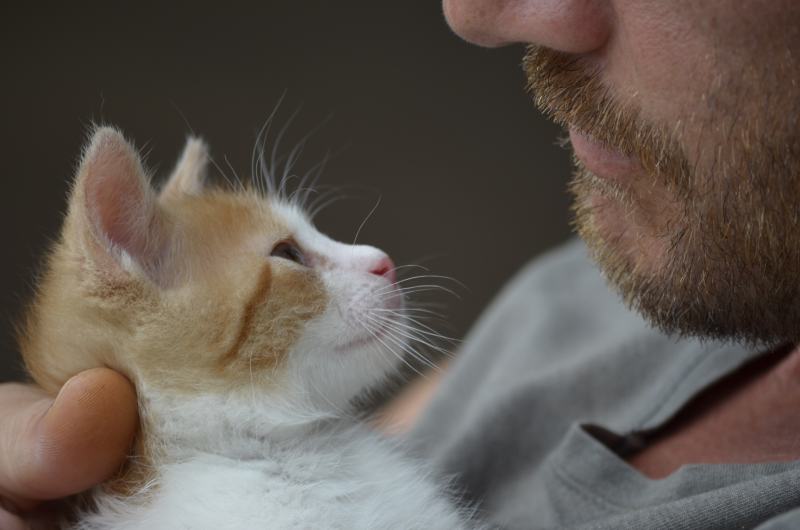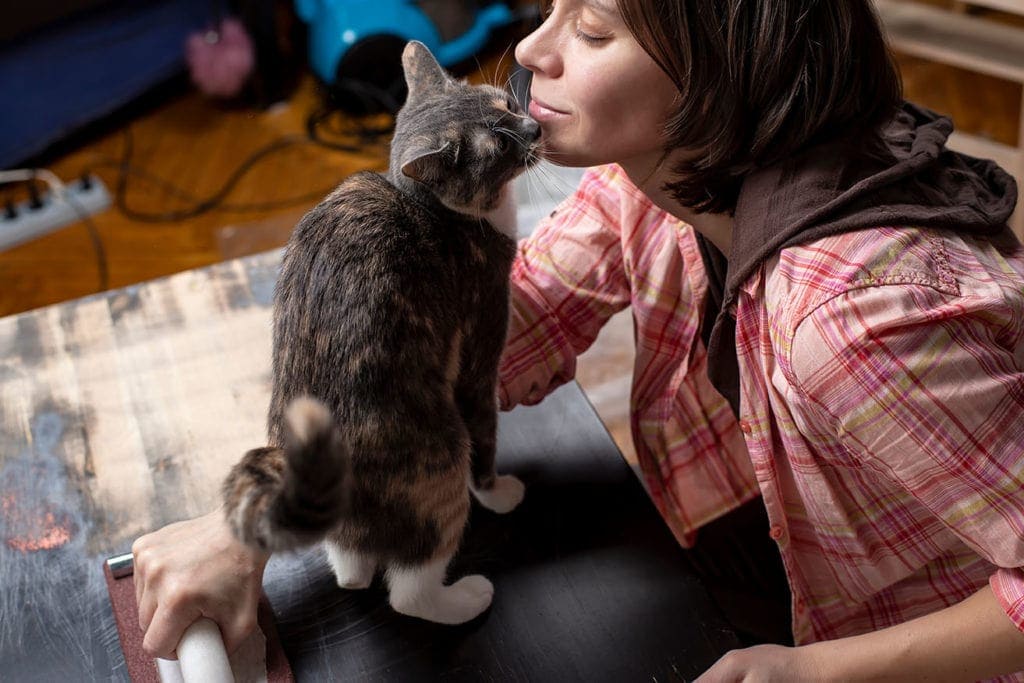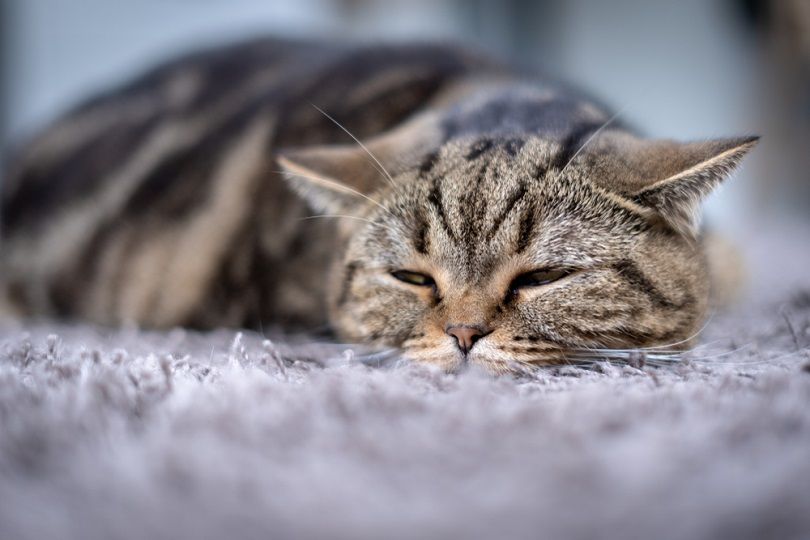Can My Cat Smell Other Cats on Me? Vet Reviewed Facts & FAQ

Updated on

Cats are known to be quite sensitive when it comes to their sense of smell. They can detect the presence of other cats in the area and even have unique ways of determining whether familiar with them. So, naturally, you may wonder if your cat can smell other cats on you. The answer is yes! Cats can detect the scent of other cats on humans and are quite adept at figuring out if they know them or not. Let’s learn more in this article.
Can My Cat Recognize Another Cat’s Scent?
Cats can to recognize the scent of other cats and can even distinguish between familiar and unfamiliar ones. This is why cats will often smell humans after they’ve been around other cats. They are trying to determine if they know the cat and if they should consider them a friend or foe.

How Can My Cat Smell Other Cats on Me?
Unlike us, cats primarily interpret the world through their nose. They recognize their surroundings and even each other via smell. Your cat’s sense of smell is much more powerful than your sense of smell, so it makes sense that they would be able to recognize the scent of another cat. Cats have scent glands located around their bodies, including on their faces, feet, and tails. When cats rub up against you, each other, or objects in the environment, they are leaving their scent and pheromones in the process. These pheromones contain chemical signals that allow them to identify and communicate with one another.
When you encounter and interact with another cat, their scent can be transferred onto your clothing and/or your skin. This is why cats will often smell you after you’ve been around other cats or whenever you return home. They are analyzing the many different scents and smells that you’ve picked up while outside. Cats are naturally territorial and smelling the scents you carry into the house is their way of investigating what’s entering their space.
Does Smelling Other Cats on Me Make My Cat Mad?
Not necessarily. While cats can detect the scent of other cats on humans, this does not always lead to aggression or negative behavior. How a cat reacts usually depends on how bonded they feel with you and their overall personality. Cats that aren’t adequately or properly socialized are also more likely to show aggression after smelling another cat on you. If your cat is displaying signs of aggression towards you or another animal in the household, then it could be due to their sense of smell detecting a perceived threat. If this is the case, it is best to seek the advice of a professional to help you manage the situation. If this is the case, it is best to seek the help of a professional to help you manage the situation. In some cases, learning how to properly introduce cats can also be beneficial.
Signs That Your Cat Isn’t Comfortable After Smelling You
- Hissing
- Scratching
- Biting
- Increased Vocalization
- Spraying and Scent Marking around the house
- Engaging in destructive behavior, such as chewing or scratching furniture
How Can I Prevent My Cat from Detecting the Scent of Other Cats on Me?
Although it may not be possible to completely eliminate the scent of other cats from your skin or clothing, there are a few things you can do to reduce it. One way is to change clothes and wash yourself after spending time around other cats. Washing your hands before interacting with your cat is always a good idea, as this minimizes the risk of transferring a harmful pathogen from your hand to your cat. You should also try to avoid contact with cats that you don’t know or aren’t familiar with as much as possible, as in addition to an unwanted scent, they might have pathogens that you could inadvertently transfer to your cat.
Additionally, using an enzymatic cleaner can help break down any lingering foreign scents in fabrics or furniture. This can help prevent your cat from becoming agitated or aggressive when they detect the scent of another cat on you. Remember that scents are transferable; if your clothes have a foreign scent and you place them on a piece of furniture such as a couch, the scent can transfer over to the couch. Additionally, using an enzymatic cleaner can help break down any lingering foreign scents in litter boxes, fabrics, or furniture. This can help prevent your cat from becoming agitated or aggressive when they detect the scent of another cat on you. Remember that scents are transferable; if your clothes have a foreign scent and you place them on a piece of furniture such as a couch, the scent can transfer over to the couch.

How Can I Ease My Cat’s Aggression After They Smell Another Cat on Me?
Tips and tricks for dealing with aggression in cats after they’ve smelled you:
- Rule out medical issues – have your vet check your cat to make sure they have no underlying health issues; some hormonal imbalances can lead to a cat that is more easily agitated and angered.
- Hire a cat behavior specialist or cat trainer – using professional help is the best option for cats that are extremely difficult to manage.
- Interact with your cat using a toy – use your cat’s favorite interactive toys, such as a feather wand, to play with your cat. Your cat might appreciate spending time with you and the toy in an interactive session, and the distraction might prove helpful.
- Gently talk to and pet your cat – if your cat isn’t acting too aggressively, gently talking to them and petting them in their favorite areas might help. After coming home, try spending time with them by cuddling in their favorite spot.
- Offer treats whenever your cat displays good behavior – if you manage to get your cat to calm down and they seem to be in a better mood, offer them a treat and some encouragement. This will teach your cat that good behavior will be rewarded with attention and a tasty morsel.
- Try interactive feeders – your cat might get progressively more aggressive the longer you stay away from them. Though such behaviors often need professional help, interactive pet feeders might be a way to provide your cat with some reassurance while you’re away. You can often record voice messages on them or speak through them during the day to provide comfort.
Can Cats Smell Other Animals Besides Other Cats?
Yes, cats can smell a variety of different animals besides just other cats, including dogs, mice, and even humans. This goes back to their sense of smell being much more powerful than a human’s and them being able to detect the presence of these animals even if they can’t see them and even if we can’t smell the scent of other animals on us.
Can Cats Send Scent Messages to Each Other?
Yes, cats can communicate with each other through scent messages. They do this by depositing pheromones on the objects they come into contact with or scent marking in their environment. These scents are unique to each cat and contain important information, such as whether a certain area is safe or if another cat is nearby. By being able to detect these scents, cats can communicate with each other without even having to be physically present. This is an important part of their social behavior and helps keep them safe in their environment.
What Other Ways Do Cats Use Their Sense of Smell?
Cats use their sense of smell to identify other animals, as well as detect food and potential dangers in their environment. They also rely on their sense of smell to communicate with each other and bond with humans. It is an important part of their overall behavior. When cats smell each other, they can identify each other’s age, health, and sexual status.

Does My Cat’s Sense of Smell Ever Decrease?
Just like humans, as cats age, their senses gradually dull. Though their sense of smell does eventually deteriorate, it does so more slowly than their sense of sight and hearing. When a cat is unwell with any ailment that involves their nose, such a flu, their sense of smell temporarily lessens. In such instances, their nose returns to normal as the underlying ailment is treated.
Do Smells Bother My Cat?
Cats may be bothered by certain smells, such as perfumes or cleaning products. It is important to avoid using strong scents near your cat. Depending on the strength and source of a smell, it may cause irritation and discomfort for your cat. Certain scented items commonly found in houses can be toxic to cats. These include air fresheners, spray deodorants, essential oils and their extracts, and certain perfumes. For safety, it is best to remove your cat from the room where you plan to use these products.
Other smells might not be dangerous until the source is ingested by your cat. Flowers may intrigue a cat and appeal to their curiosity. However, many flowers are toxic for cats. These include daffodils, tulips, and peonies. Always double check any plant to wish to keep in your house if you have a cat to ensure that it isn’t toxic for your cat.
Can Cats Detect Illness?
When two cats sniff each other, each cat can get an indication of the other’s health status. Evidence suggests that cats may also be able to smell hormonal changes in humans and react to them. Though there are anecdotal stories with regards to their ability to smell cancer in humans, formal studies on this phenomenon haven’t been performed yet.
Conclusion
Cats have an incredibly powerful sense of smell, so it’s no surprise that they can detect the presence of other cats on humans. While there isn’t much you can do to completely prevent your cat from smelling another cat on you, you can limit contact with other cats and use appropriate cleaners to help reduce the scent transferred onto you. In addition, behavioral training and healthy interactions with your cat can help minimize any potential aggression that results from them smelling another cat on you.
Certain smells may not only bother your cat, but also prove toxic for them. Always check for the safety of any aerosols you intend to use in your house with your vet or local poison control center. As a general rule, it is best to always temporarily remove your cat from the room where an aerosol will be used. Many plants have an enticing smell but are toxic for cats if ingested; always research a plant with regards to its safety and computability with cats before bringing it to your house.
Featured Image Credit: JumpStory












